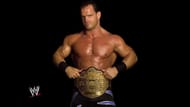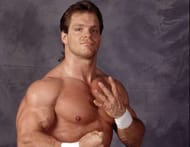
On June 25, 2007, the world of sports entertainment was forever changed with one of the biggest tragedies in the history of professional wrestling. For a few days, everything was a blur as information about the incident was scarce and confusing, leading to rumours and speculation which have even persisted to this day.
Eventually, many more details would come out and soon enough, Chris Benoit became a household topic for all the wrong reasons. Next month will be the ten year anniversary of The Rabid Wolverine’s murder-suicide and to this day, there are still hot-button issues people debate about on a daily basis.
One of those topics which seem to come up rather frequently is the question of whether or not it is okay to cherish the legacy of someone who ended his life on such a horrific note.
10 WWE Stars Who Are Now Banned - Find Out Now!
Given the circumstances, how could there be apologists for Chris Benoit? How could anybody see past the negatives to defend him?
Ignoring the people who want to have a controversial opinion purely for the sake of getting a rise out of other people, there seem to be five main reasons why fans still love Chris Benoit, despite all the baggage that comes along with doing so.
#1 Judgment on technical talent alone
In professional wrestling, there’s always a bit of truth to the performance, but there needs to be a separation as well. Just as with actors in any profession, characters are not the same as the people portraying them, whether that is for the better or the worse.
Thankfully, Sir Anthony Hopkins is not actually a cannibalistic serial killer like Dr Hannibal Lecter, but in the same regard, putting on a Superman outfit isn’t going to make that actor incorruptible.
If we ignore everything about Chris Benoit’s personal life and examine him just as a wrestling character, it’s easy to see why he had a fan base: he was talented.
It’s doubtful many people would rank him in the top five technical wrestlers of all time, but as evidenced by his various feuds over the years where he had fantastic matches with Chris Jericho, Eddie Guerrero, Kurt Angle and more, of course, he would have his supporters from an in-ring perspective.
Many purists of technical wrestling are quick to label him with the word “innovative” with the Crippler Crossface and other staples which have just become more standardised moves over the years.
High-flying acrobats receive a certain level of admiration as do people like Benoit, who was classified more of a submission specialist, which at times can be a rare sight when more focus is put on brawlers.
The argument, when the Hall of Fame is brought up, is always whether it is okay to honour the accomplishments of the fictional character and the performer behind those shows without acknowledging the way his story ended.
If those attributes could be transferred to somebody else who had a perfectly fine life but just wasn’t as talented, that person would be inducted with no problem.
Chris Benoit had a Hall of Fame-worthy career built up based on his accolades and overall performance value and he threw it all away, but his fans are still able to appreciate everything before he did what he did.
#2 He was an underdog
People love to root for the underdog and in the world of professional wrestling, that usually comes in two forms. First, there is the gifted technical wrestler who doesn’t have the mic skills to be a larger than life persona like Hulk Hogan, Randy Savage, Ultimate Warrior and so forth.
Second, there are the smaller framed guys who typically are allowed to flourish in the midcard, but will never reach past the Intercontinental Championship level of reward for their efforts. Chris Benoit was far from the smallest man on the roster, but he certainly wasn’t the same size, nor the same type of performer as the typical main event choices.
In WCW, he was considerably different from Goldberg and Kevin Nash. In WWE, The Undertaker and Triple H appeared to be on a higher tier than he operated from. But whenever someone is talented enough to catch the attention of the crowd despite not being an obvious choice for the company to push, fans tend to latch onto them to give them support.
If it seems like they aren’t going to get to the top without some help from the crowd, but the fans feel they deserve to be pushed, they’ll certainly voice their opinions loud and clear, just as they’ve done with folks like Daniel Bryan and Sami Zayn.
There’s also a certain level of respect the fans have for people who work the independent scene, travel between different companies and work their way up from the bottom rung, which is what Benoit did by wrestling not just in WWE but WCW and ECW among other territories.
Chris Benoit could have easily been a career midcarder, but by being in a position where he wasn’t pushed to the moon too fast, he was able to garner sympathy from the audience that felt he deserved better, making him actually seem even greater in general just because it wasn’t being acknowledged by the powers that be.
#3 Blind with nostalgia
Outside of judging his talent and wanting to support the underdog, there are a few reasons why Chris Benoit is beloved, that are more on the negative spectrum. The least problematic of these is the rose-coloured glasses effect where fans grew up watching Benoit and associate him with their childhood.
This is something we’re all guilty of at some point, whether it explains our love of certain foods or entertainment or smells or virtually any aspects of our lives that we associate with a happier time in the past we’d like to go back to.
All too often, people will complain that wrestling isn’t as good as it used to be, but if they actually sat down and watched the television episodes from that time frame without the context of having gone through it live, they probably wouldn’t adhere to the same opinion anymore.
For example, the Attitude Era is always sharply complimented, but fans are selectively remembering the best parts and editing the bad stuff out of their memories. The same applies to some Chris Benoit fans, who fondly remember his greatest matches and moments, but ignore anything that is largely forgettable.
If you were super excited to see him win the Royal Rumble and the World Heavyweight Championship, then 2004 was an amazing year for you to look back on and have great memories of Benoit that counteract the bad thoughts from 2007 and onward.
When hearing his name, a more optimistic person coming from a point of nostalgia will immediately think of something positive from his past, rather than jumping straight to a mental image of the tragedy that sullied his name.
#4 Praising the dead
An offshoot of the nostalgia trip is the idea that some people knowingly or subconsciously fall victim to praising the dead a little too much. This is certainly not exclusive to professional wrestling as people do it constantly with celebrities or even the regular average Joe.
The day before Michael Jackson died, he was laughed at as he had been for years, mocked for his odd quirks and called every name in the book. The day he passed away, those same people changed their tunes to suddenly become his biggest fan again. The jokes stopped and the praise rushed in to fill that void.
Whenever someone dies, a good amount of people just can’t help but feel like they “cannot speak ill of the dead” and have to overcompensate by changing tunes and thinking that person was greater than they ever were.
Criminals suddenly become absolved of their sins. Drug addicts go from being looked down upon to having apologists who pity them for “succumbing to their demons” and such. Everybody’s worst qualities aren’t mentioned as much and their best qualities are magnified immensely.
In Benoit’s case, since he didn’t die of natural causes or some sort of sympathetic fashion, this is nowhere near as prevalent as it would have been under other circumstances, but there are still some fans who try to argue that his death means he should be allowed in the Hall of Fame to honor a fallen ring warrior.
Defenders of Benoit should be careful not to become ensnared in eulogising him posthumously just because he’s no longer with us, but rather, try to stick more to the facts of what did and didn’t happen.
#5 His intensity was infectious
For better or worse, fans love it when it seems like the in-ring action is brutal—or at least appears to be. It seems like the more things seem to hurt, the more it justifies being able to cheer for someone’s performance.
An example of this is Mick Foley’s career, where despite all the great things he’s done, the most memorable aspect of his run was his Hell in a Cell match against The Undertaker, which potentially took years off his life.
While Benoit was not the most brutal of hardcore-style wrestlers, in the sense that he was not going out every night and throwing himself into barbed wire, smashing light bulbs on his head and getting stabbed with a fork, he exhibited a type of intensity that merged the gap between amateur and hardcore wrestling.
When Benoit dove off the top rope and landed a headbutt, it didn’t seem as fake as when other people do it, and your gut reaction wasn’t to scoff at it but to wince. The Money in the Bank match at WrestleMania 21 is a great example, as there are repeated instances where Benoit appears to be putting his life on the line.
By the end of the match, he’s shrieking in pain, clutching his injured arm and bleeding from his forehead, and all of that was for nothing as he wasn’t even the winner of the match.
When fans see that someone treats professional wrestling less like a dance and more like an actual athletic competition, they tend to hold them in higher esteem as they respect the damage they’re doing to their bodies.
This is a cautionary tale, though, as those same fans may rarely think of the consequences to follow by wrestling this type of style. Had Benoit not sacrificed as much as he had for the benefit of his performances, he may not have suffered the injuries which potentially led him to his actions ten years ago.
In retrospect, any decent person would rather see him downgrade his style if it meant a safer outcome, as no amount of entertainment value can supersede the importance of the real lives behind the curtain.
Since then, advancements in maintaining the health of professional wrestlers has increased and more attention is given to preventing these downfalls from happening in the future, so thankfully, the next generation of athletes will not suffer the same consequences and this may never happen again.
What are your thoughts on Chris Benoit’s legacy? Should he be revered or cast out of the record books? Tell us what’s on your mind in the comments section below!
Send us news tips at fightclub@sportskeeda.com
Make Sportskeeda your preferred choice for WWE content by clicking here: Source preferences






